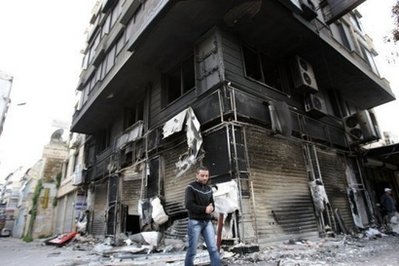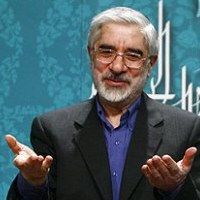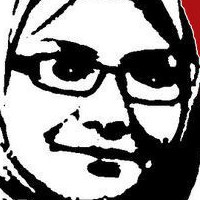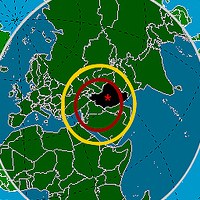![]()
Sun, April 10, 2011 | The Meir Amit Intelligence and Terrorism Information Center

A man walks past a burnt-out building in the northern Syrian city of Latakia in March 2011. Syrian students rallied in Damascus on Monday to express solidarity with protesters killed over the weekend, as the army moved in on the flashpoint town of Banias. (AFP/File/Anwar Amro)
Riots in Syria as Product of Western Plot: Iranian Media on Syria Developments
This past week, most of Iran’s conservative media have continued to provide highly limited coverage of the riots in Syria. In contrast to the extensive coverage of the events in Bahrain, Egypt, and Libya, the Iranian media almost completely ignored the events in Syria, covered in more detail only by reformist opposition-affiliated media. Conservative media did report, however, a support rally for President Bashar Assad held in Damascus last week.
As riots broke out in Syria, the official news agency IRNA referred to the demonstrators as unruly rioters seeking to undermine public order and cause damage to private property, claiming that the Syrian government was forced to take the necessary measures to restore order. In addition, Iranian news agencies claimed that the U.S. and Israel were behind the latest riots. Last weekend, IRNA cited a report that had first appeared on Syrian TV, according to which one of the demonstrators detained by Syrian security forces was an American of Egyptian descent, who had admitted during questioning that he was assisted by Syria’s enemies, including Israel, to compromise Syrian security (IRNA, March 27).
Mehr News Agency also reported, citing official Syrian sources, that it was the U.S. and Israel that instigated the riots in Syria as part of a premeditated plan to hit Syria for its support of the resistance camp. According to the news agency, the time and place of the riots were carefully chosen by Western countries to destabilize the regime in Damascus. Even if there is some justification for the economic and political demands of Syrian citizens, says a commentary article published by Mehr, the events in Syria are exploited by questionable elements to turn Syrians against their government and cause a political crisis that will serve Israel’s interests. The article further claims that those who took part in the riots have nothing to do with the values and principles of the “Syrian nation of resistance” and that the Syrian regime has documents showing that people from Arab and non-Arab countries took part in the riots and fired at civilians and security forces.
The instability in Syria does not serve the Syrian people, Mehr claimed, but rather its enemies: the U.S., Israel, and those Arab countries seeking to force it into submission. The Syrian people have proven, however, that they will not back down from their anti-Zionist positions and that Syria will continue supporting anti-Israeli resistance despite the schemes concocted by the enemies of the resistance front (Mehr, March 28).
Last week, the conservative website Alef published a commentary article in response to the claims brought up by some of its readers about the Iranian media ignoring the recent events in Syria.
The website claimed that if the riots in Syria were popular rather than driven by foreign powers, the Iranian media would treat them the way it treated the riots in Yemen, Egypt, and Bahrain. The website questioned the reliability of Western media reports on the events in Syria, claiming they reflected the objectives and tendencies of Western media, seeking to exaggerate the extent of the riots. According to Alef, while Western media provided extensive coverage of the riots in Syria, they almost completely ignored the crimes committed by the Saudi soldiers recently sent to suppress the riots in Bahrain. In March 14-20, the two Western news agencies AP and Reuters released 39 reports about the happenings in Syria, compared to only 9 reports on the events in Yemen and Bahrain. This is similar, according to Alef, to the Western media’s biased coverage of the 2005 Iranian presidential campaign, which completely ignored conservative candidates and reported alleged extensive support for reformist candidate Mostafa Mo’in and projected him as winner.
The website added that it is only natural that Iran should support its ally, Syria, which faces their two common enemies, the U.S. and Israel, and assists Lebanese and Palestinian resistance movements. Hinting at reformist media that widely covered the riots in Syria, Alef noted that those who are glad and content to report on the order violations in Syria are probably not aware of Syria’s strategic importance for Iran, since the policy of that country helps keep Iran’s enemies away from its borders. The Iran-Syria alliance against the West and Israel should not result in disregard for the reality in Syria, the article says, and violations of the freedom of expression in Syria are as unfortunate as they are in other Arab countries. One must not forget, however, that those who preach democracy and human rights have ignored the events in Bahrain in recent weeks, and that Western countries benefit the most from the order violations in Syria and will do everything to kindle them (Alef, March 26).
Extraordinary criticism about the disregard of Iran’s official media for the events in Syria was published on Asr-e Iran, a website affiliated with the pragmatic moderate bloc. A commentary article published by the website says that the developments in Syria are highly significant for Iran in view of the strategic relations between the two countries, and that they cannot therefore be ignored. The website argued that not only is there no difference between the suppression of individual freedoms in Syria and the situation in other Arab countries, the situation in Syria is in fact even more dire than in most of the Arab world. The website even expressed reservations about the fact that while Syria is defined as a republic, Bashar Assad inherited power from his father, Hafez. The website also wondered why Iran’s English and Arabic media reported on the riots in Syria while the Persian-language broadcasting ignored them. According to Asr-e Iran, even official Syrian media and Hezbollah media in Lebanon did not ignore the riots, making it unclear why Iran Broadcasting preferred to ignore the events in Syria and even completely ignored the Syrian security forces’ attack on unarmed demonstrators in a mosque in the city of Daraa, in which 20 people were killed. The website mentioned that the riots which broke out in Iran following the presidential elections in the summer of 2009 were covered by Syrian media.
Referring to the claim that Iran must not take measures that may compromise Syria due to its support for Iran and the resistance in Lebanon and Syria, Asr-e Iran said that this support has to do with national Syrian interests. Informing the Iranian public about the internal situation in Syria does not harm the Syrian government, instead being a measure aimed to increase Iranian citizens’ awareness of the developments in this important country. According to the website, Iran Broadcasting’s disregard for the events in Syria undermines the Iranian public’s trust in official media, forcing Iranians to go to other media to get the information they want (Asr-e Iran, March 29).



 RSS
RSS










Riots in #Syria as Product of Western Plot: Iranian Media on Syria Developments | #Iran #Israel http://j.mp/esAouc
RT @CrethiPlethi: Riots in #Syria as Product of Western Plot: Iranian Media on Syria Developments | #Iran #Israel http://j.mp/esAouc
RT @CrethiPlethi: Riots in #Syria as Product of Western Plot: Iranian Media on Syria Developments | #Iran #Israel http://j.mp/esAouc